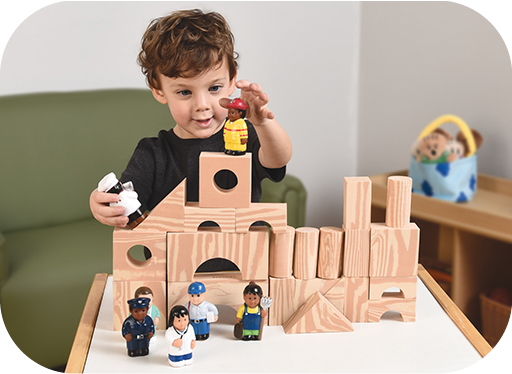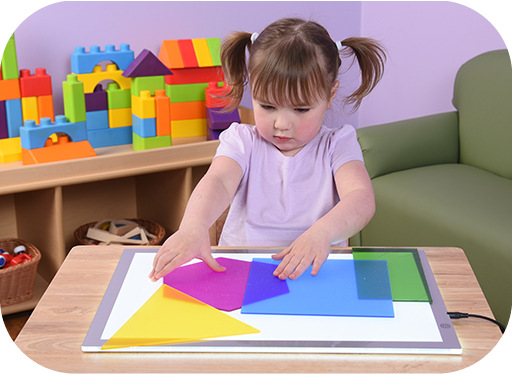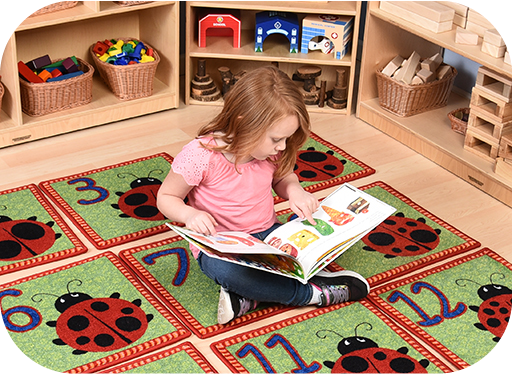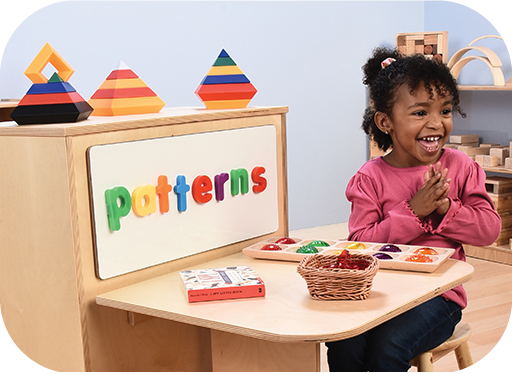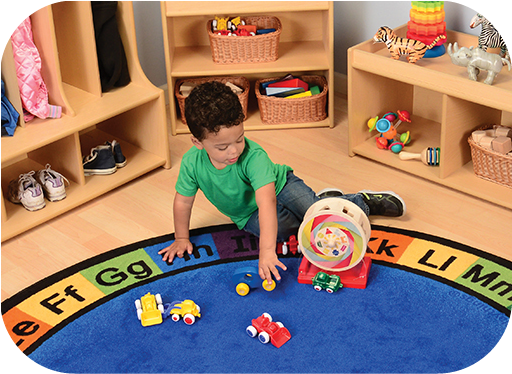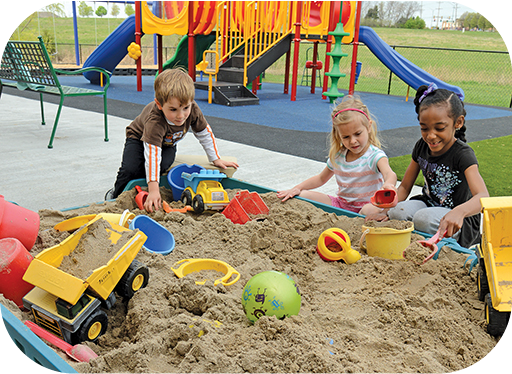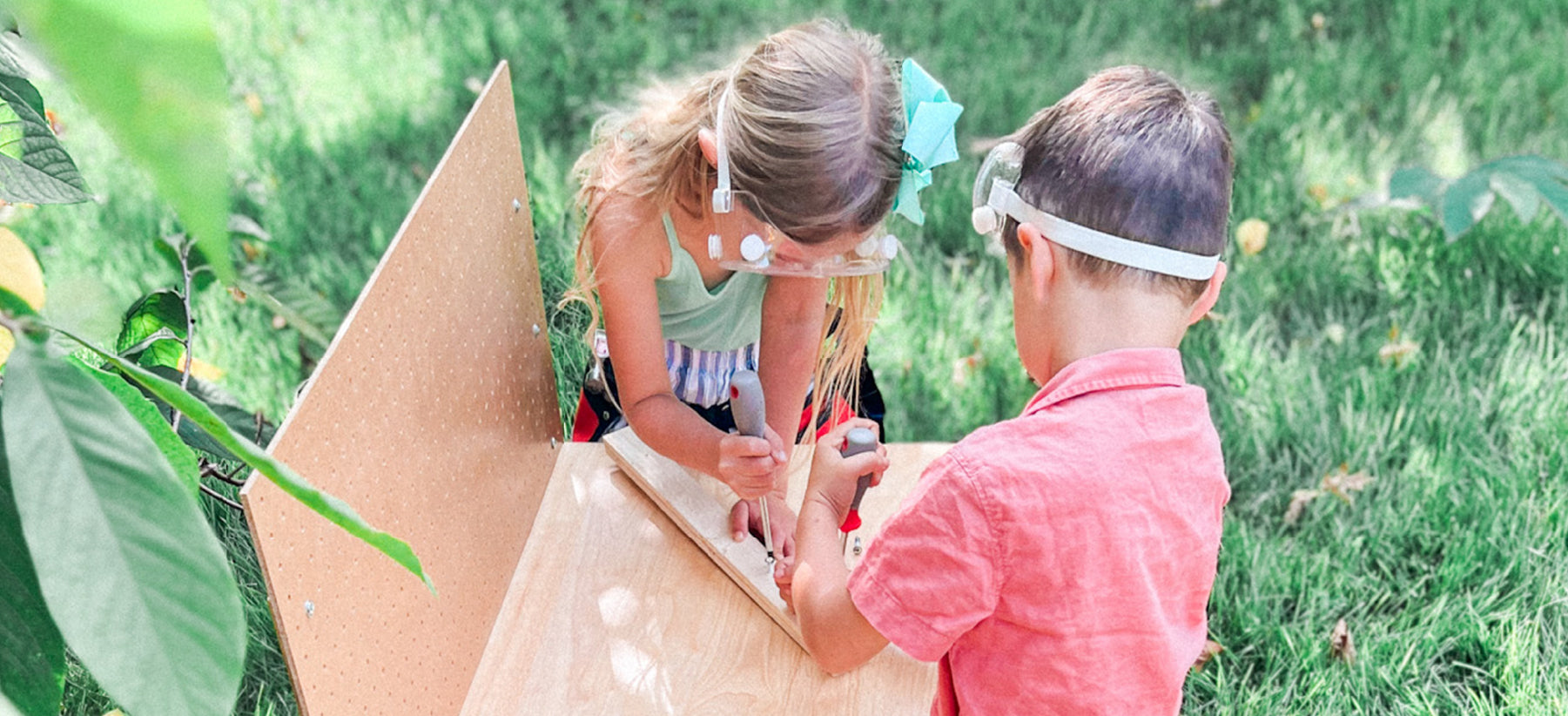
The Hidden Benefits of Woodworking and Risky Play for Young Children: A Look at Little Leaders Academy’s Approach
Author: April Maura Robert
As a mom, and the founder of Little Leaders Academy, I often find myself reflecting on the deeper lessons we can instill in our children through the experiences we provide. One of the greatest gifts we can give them is the opportunity to engage in what some might call "risky play"—activities that challenge them, both physically and mentally, like woodworking and building.
At Little Leaders Academy, a nature school here in St. Louis, we prioritize hands-on experiences that nurture children’s natural curiosity. One such experience we offer is woodworking. Yes, I’m talking about hammers, nails, and even real tools, specifically designed for their age group, like the Constructive Playthings Little Carpenter Kids Wooden Work Bench, the Wood Nut and Bolt Builder, and the 5-Piece Real Tool Set with Adjustable Tool Belt. While this may seem risky, the benefits for your child's well-being far outweigh any concerns you may have—and we do it all with the utmost attention to safety.

Why Risky Play is Essential: Insights from Jonathan Haidt
Dr. Jonathan Haidt, social psychologist and author of The Coddling of the American Mind, emphasizes the importance of risky play in developing resilience and independence in children. In a world where we’re constantly trying to protect our children from every danger, we often forget that some risks are necessary for growth. Haidt argues that when children are allowed to engage in activities that challenge them—like woodworking—they learn to navigate risk, solve problems, and build self-confidence.
Woodworking may seem like an activity where safety concerns should take center stage, but Haidt’s research suggests that overprotectiveness can stunt a child’s development. Kids need opportunities to face challenges head-on in a controlled, supervised environment. This teaches them how to make decisions, assess risks, and experience the satisfaction of overcoming obstacles. At Little Leaders Academy, we see woodworking as an integral part of this process.

Addressing Concerns About Safety
One of the most common concerns parents have is the potential for injury. Understandably, the idea of young children handling real tools like hammers, saws, or nails may make some parents nervous. But here’s the thing: we don’t just hand a 5-year-old a saw and say, “Good luck!” We start slow, using age-appropriate, child-friendly tools like the Wood Nut & Bolt Builder or the Constructive Playthings Little Carpenter Kids Wooden Work Bench. These tools are designed to allow young kids to experiment with woodworking without the dangers of sharp edges or heavy equipment.

We also teach children how to use tools safely. Woodworking at Little Leaders Academy is a guided, intentional process, with skilled educators overseeing every step. Kids learn the value of patience, precision, and attention to detail. They also learn that mistakes happen—and that’s okay! It’s all part of the learning process. With safety gear like goggles, gloves, and adjustable tool belts, we ensure that they’re well-protected while working on their projects.
The Developmental Benefits of Woodworking
Parents sometimes ask, “Is my child ready for this?” It’s a valid question, but one we can answer with a resounding yes. Woodworking can be adapted for different ages and skill levels. Whether your child is sanding down wood or piecing together a structure with screws and bolts, they’re developing fine motor skills and hand-eye coordination.

But it’s about so much more than just physical development. When children work with their hands, they are engaging in constructive play—the kind that builds cognitive abilities. They learn how to plan, think critically, and problem-solve. These are the very skills that translate into academic success later in life.
Moreover, woodworking gives children a tangible sense of accomplishment. There’s something incredibly satisfying about seeing a project through from start to finish—especially when it’s something they’ve built with their own two hands. It builds a sense of self-efficacy, and when children realize they can create something out of nothing, it changes how they see themselves. They begin to believe that they can tackle bigger challenges and, eventually, more complex problems.
Breaking Gender Stereotypes
Another concern that sometimes arises is that woodworking is traditionally viewed as a male-dominated activity. But we strongly believe in offering every child the same opportunities, regardless of gender. At Little Leaders Academy, we encourage both boys and girls to get their hands messy and participate in activities like woodworking. It’s about breaking down barriers and showing children that they are capable of anything.

By providing these experiences, we’re helping girls and boys alike to challenge traditional stereotypes and grow into confident individuals. We’ve found that woodworking helps both boys and girls embrace the mindset that they can build, create, and problem-solve.
Woodworking as a Gateway to Responsibility
Parents often worry that woodworking will be too messy or too time-consuming. Yes, it can get a little messy, but here’s the beauty of it: kids love cleaning up when they’ve been fully involved in creating something. At Little Leaders Academy, we teach responsibility alongside every activity. Children know that part of their work includes cleaning their workspace, putting away tools, and taking care of their materials. This is a valuable life lesson that extends beyond the classroom.
Fostering a Sense of Community
One of the often-overlooked benefits of woodworking is how it brings children together. Group projects, where kids work collaboratively to build something, foster a sense of community and shared responsibility. At Little Leaders Academy, we prioritize these kinds of activities because we believe in teaching not just academic skills, but social and emotional skills as well.

Our nature-based curriculum is designed to connect children with each other and the world around them. When they’re working together in nature, whether building a birdhouse or constructing a simple bench, they learn the value of teamwork and cooperation.
Why Parents Should Embrace Risky Play
When it comes to woodworking, or any other form of risky play, we understand that parents may be hesitant. But here’s the truth: avoiding risk altogether won’t prepare children for the real world. Life is full of challenges, and our goal at Little Leaders Academy is to equip children with the tools they need to navigate those challenges confidently.
We take safety seriously, but we also believe that children need to experience the natural consequences of their actions. Through activities like woodworking, we give them the space to explore their abilities and develop resilience in the process.
Why Little Leaders Academy Prioritizes Play
At Little Leaders Academy, we see play as the foundation for all learning. Whether your child is using the 5-Piece Real Tool Set with Adjustable Tool Belt or exploring nature in our outdoor classroom, they are engaging in a form of learning that is rich, meaningful, and lasting. Play is where children discover their passions, develop critical thinking skills, and build the emotional strength to take on life’s challenges.
Incorporating woodworking into our curriculum allows us to offer a balanced education—one that nurtures the mind, body, and soul. We invite St. Louis parents to explore this adventure with us. Through hands-on learning, we’re raising the next generation of leaders, creators, and innovators.

So why not give your child the gift of adventure? At Little Leaders Academy, learning isn’t just about sitting in a classroom—it’s about experiencing the world in a way that’s rooted in love, growth, and endless possibilities.
Empowering the Next Generation: A Global Call for Hands-On Learning and Risky Play
Whether you're in St. Louis or across the world, the principles of hands-on learning, risky play, and woodworking offer universal benefits for young children. As parents, it's easy to want to protect our kids from every bump and scrape, but by allowing them to engage in these experiences, we’re giving them the confidence, resilience, and creativity they need to thrive in an ever-changing world.
At Little Leaders Academy, we've seen firsthand the power of play-based, nature-focused learning. But this isn't just about our school—it’s a call to parents everywhere to rethink how we approach education and child development.
Encourage your child to explore, to build, to take healthy risks, and to discover their capabilities in an environment filled with love and support.
If you're passionate about helping your child grow through adventure, creativity, and hands-on experiences, explore local options that align with these values. Seek out schools, programs, or even home-based activities that embrace risky play and foster your child's natural curiosity. Together, we can nurture the next generation of resilient, confident, and innovative children, no matter where in the world you are.
Let’s raise leaders, creators, and thinkers who are not afraid to get their hands dirty and build something incredible—starting today!


